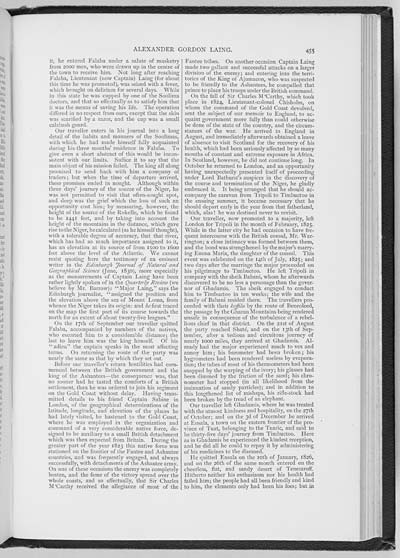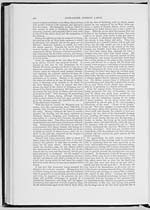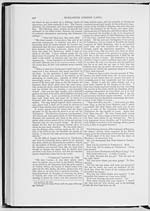455
it, he entered Falaba under a salute of musketry
from 2000 men, who were drawn up in the centre of
the town to receive him. Not long after reaching
Falaba, Lieutenant (now Captain) Laing (for about
this time he was promoted), was seized with a fever,
which brought on delirium for several days. While
in this state he was cupped by one of the Soolima
doctors, and that so effectually as to satisfy him that
it was the means of saving his life. The operation
differed in no respect from ours, except that the skin
was scarified by a razor, and the cup was a small
calabash gourd.
Our traveller enters in his journal into a long
detail of the habits and manners of the Soolimas,
with which he had made himself fully acquainted
during his three months' residence in Falaba. To
give even a short abstract of this would be incon-
sistent with our limits. Suffice it to say that the
main object of his mission failed. The king all along
promised to send back with him a company of
traders; but when the time of departure arrived,
these promises ended in nought. Although within
three days' journey of the source of the Niger, he
was not permitted to visit that often-sought spot,
and deep was the grief which the loss of such an
opportunity cost him; by measuring, however, the
height of the source of the Rokelle, which he found
to be 1441 feet, and by taking into account the
height of the mountains in the distance, which gave
rise to the Niger, he calculated (as he himself thought),
with a tolerable degree of accuracy, that that river,
which has had so much importance assigned to it,
has an elevation at its source of from 1500 to 1600
feet above the level of the Atlantic. We cannot
resist quoting here the testimony of an eminent
writer in the Edinburgh Journal of Natural and
Geographical Science (June, 1830), more especially
as the measurements of Captain Laing have been
rather lightly spoken of in the Quarterly Review (we
believe by Mr. Barrow): "Major Laing," says the
Edinburgh journalist, "assigned the position and
the elevation above the sea of Mount Loma, from
whence the Niger takes its origin: and he first traced
on the map the first part of its course towards the
north for an extent of about twenty-five leagues."
On the 17th of September our traveller quitted
Falaba, accompanied by numbers of the natives,
who escorted him to a considerable distance; the
last to leave him was the king himself. Of his
" adieu" the captain speaks in the most affecting
terms. On returning the route of the party was
nearly the same as that by which they set out.
Before our traveller's return hostilities had com-
menced between the British government and the
king of the Ashantees�the consequence was, that
no sooner had he tasted the comforts of a British
settlement, than he was ordered to join his regiment
on the Gold Coast without delay. Having trans-
mitted details to his friend Captain Sabine in
London, of the geographical determinations of the
latitude, longitude, and elevation of the places he
had lately visited, he hastened to the Gold Coast,
where he was employed in the organization and
command of a very considerable native force, de-
signed to be auxiliary to a small British detachment
which was then expected from Britain. During the
greater part of the year 1823 this native force was
stationed on the frontier of the Fantee and Ashantee
countries, and was frequently engaged, and always
successfully, with detachments of the Ashantee army.
On one of these occasions the enemy was completely
beaten, and the fame of the victory spread over the
whole coasts, and so effectually, that Sir Charles
M'Carthy received the allegiance of most of the
Fantee tribes. On another occasion Captain Laing
made two gallant and successful attacks on a larger
division of the enemy; and entering into the terri-
tories of the King of Ajumacon, who was suspected
to be friendly to the Ashantees, he compelled that
prince to place his troops under the British command.
On the fall of Sir Charles M'Carthy, which took
place in 1824, Lieutenant-colonel Chisholm, on
whom the command of the Gold Coast devolved,
sent the subject of our memoir to England, to ac-
quaint government more fully than could otherwise
be done of the state of the country, and the circum-
stances of the war. He arrived in England in
August, and immediately afterwards obtained a leave
of absence to visit Scotland for the recovery of his
health, which had been seriously affected by so many
months of constant and extreme exposure in Africa.
In Scotland, however, he did not continue long. In
October he returned to London, and an opportunity
having unexpectedly presented itself of proceeding
under Lord Bathurst's auspices in the discovery of
the course and termination of the Niger, he gladly
embraced it. It being arranged that he should ac-
company the caravan from Tripoli to Timbuctoo in
the ensuing summer, it became necessary that he
should depart early in the year from that fatherland,
which, alas! he was destined never to revisit.
Our traveller, now promoted to a majority, left
London for Tripoli in the month of February, 1825.
While in the latter city he had occasion to have fre-
quent intercourse with the British consul, Mr. War-
rington; a close intimacy was formed between them,
and the bond was strengthened by the major's marry-
ing Emma Maria, the daughter of the consul. This
event was celebrated on the I4th of July, 1825; and
two days after the marriage the major proceeded on
his pilgrimage to Timbuctoo. He left Tripoli in
company with the sheik Babani, whom he afterwards
discovered to be no less a personage than the gover-
nor of Ghadamis. The sheik engaged to conduct
him to Timbuctoo in ten weeks; the wife and the
family of Babani resided there. The travellers pro-
ceeded with their koffila by the route of Beneoleed,
the passage by the Gharan Mountains being rendered
unsafe in consequence of the turbulence of a rebel-
lious chief in that district. On the 21st of August
the party reached Shat�, and on the 13th of Sep-
tember, after a tedious and circuitous journey of
nearly 1000 miles, they arrived at Ghadamis. Al-
ready had the major experienced much to vex and
annoy him; his barometer had been broken; his
hygrometers had been rendered useless by evapora-
tion; the tubes of most of his thermometers had been
snapped by the warping of the ivory; his glasses had
been dimmed by the friction of the sand; his chro-
nometer had stopped (in all likelihood from the
insinuation of sandy particles); and in addition to
this lengthened list of mishaps, his rifle-stock had
been broken by the tread of an elephant.
Our traveller left Ghadamis, where he was treated
with the utmost kindness and hospitality, on the 27th
of October; and on the 3d of December he arrived
at Ensala, a town on the eastern frontier of the pro-
vince of Tuat, belonging to the Tuaric, and said to
be thirty-five days' journey from Timbuctoo. Here
as in Ghadamis he experienced the kindest reception,
and he did all he could to repay it by administering
of his medicines to the diseased.
He quitted Ensala on the 10th of January, 1826,
and on the 26th of the same month entered on the
cheerless, flat, and sandy desert of Tenezaroff.
Hitherto neither his enthusiasm nor his health had
failed him; the people had all been friendly and kind
to him, the elements only had been his foes; but in

![]() Universal Viewer |
Universal Viewer | ![]() Mirador |
Large image | Transcription
Mirador |
Large image | Transcription
![]()

